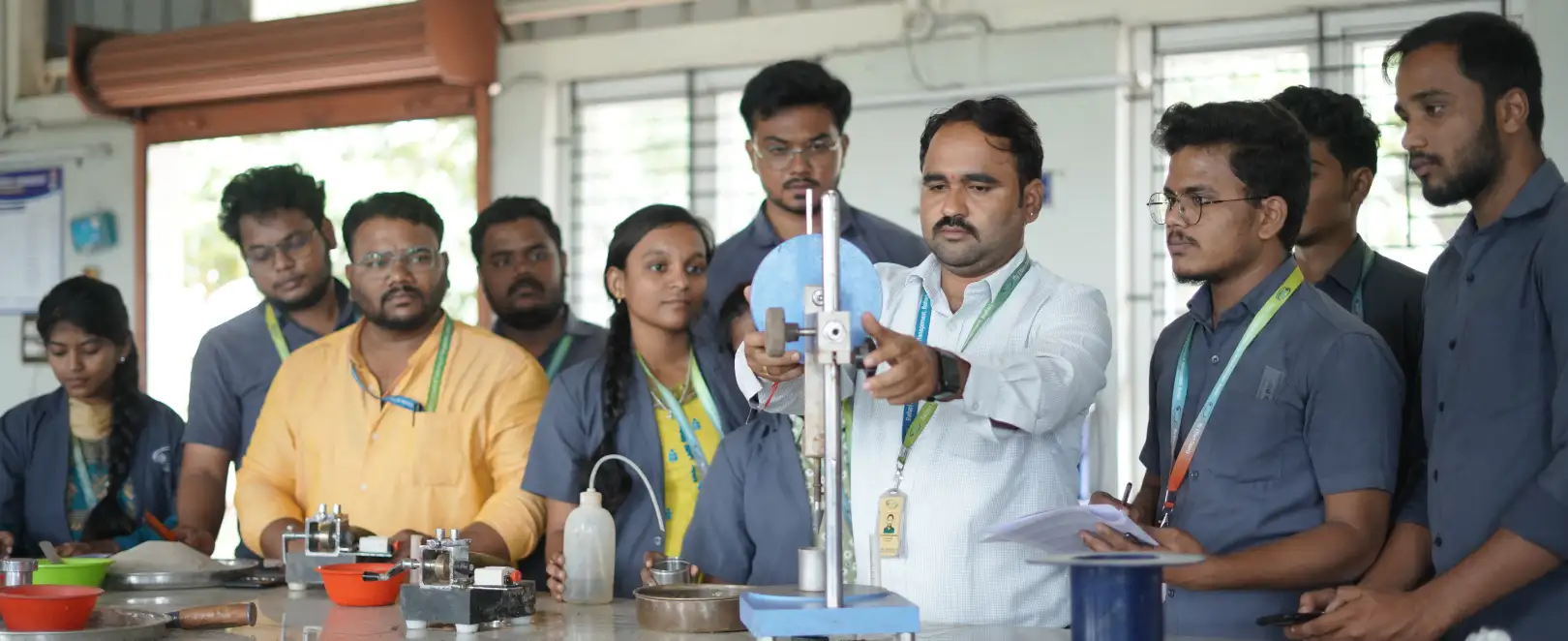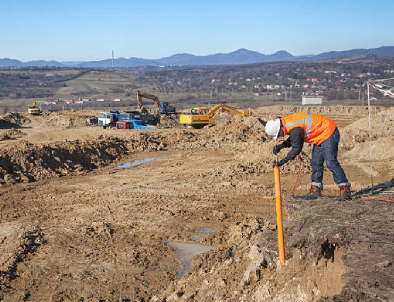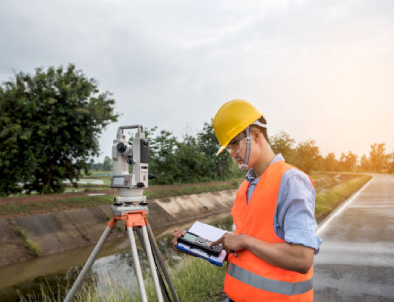Programme Level
Under Graduate
Duration
4 Years
About the Program
Program Overview
The Bachelor of Engineering (B.E.) course in Civil Engineering is a 4-year professional undergraduate program that provides an intellectual foundation and understanding of the fundamentals of all the core civil engineering disciplines, preparing the students to opt for diversified careers in engineering, technology, project management, and entrepreneurship/firms. The program caters civil engineering students to acquire core skills.
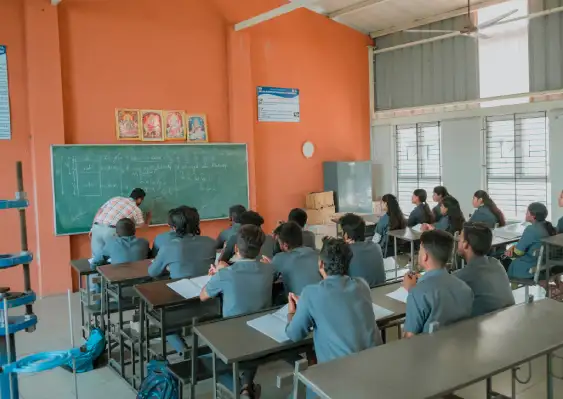
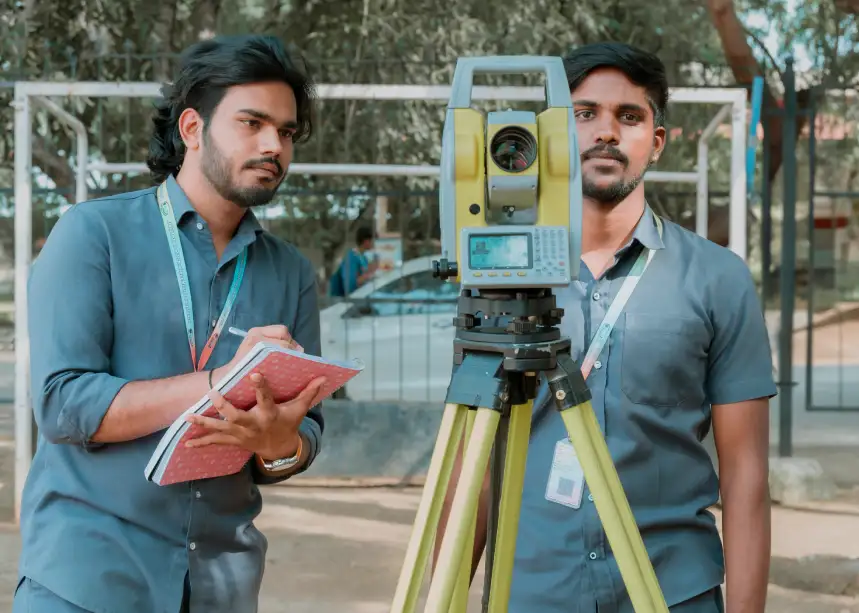
Civil engineering is a continuously evolving field with new technologies, concepts, and materials being developed daily. The scope of Civil engineering is vast, with opportunities ranging from design CADD drawings to building structures, construction engineering, 3D elevations, irrigation engineering, PWD sector, bridge engineering, tunnel and railway engineering and many more. There is immense scope for civil engineers, and it is expected to keep growing alongside with the development of infrastructure in day-to-day life.
The department is one of the most popular engineering branches in the college equipped with state of art laboratory facilities like concrete and highway material testing, advanced surveying, geotechnical engineering, building material testing, geology, computer aided design and drawing, environmental engineering and fluid mechanic laboratories. The department has a good blend of experienced and highly qualified faculty.
The Department has an intake of 60 students from the academic year 2022-23 and is accredited with NAAC, and NBA and is certified by ISO-9001:2015.
Eligibility Criteria
Students who have passed Karnataka 2nd PUC/ 12th Std, / 10+2 / Intermediate or equivalent exam with Physics & Mathematics along with Chemistry/ Computer Science / Biology and any other optional subject with English as one of the languages of study and should have obtained a minimum of 45% marks. For SC/ST & other backward classes of Karnataka students only, the minimum marks is 40% in aggregate in the optional subjects in the qualifying examination, irrespective of marks obtained in the Common Entrance Test / COMED-K/ AIEEE.
(Eligibility as per the Govt. Norms from time to time.)
Career Options
A degree in Civil Engineering opens up a wide range of career opportunities across various sectors.
Program Fees
Duration
4 Years
Program
Civil Engineering
Type
- SNQ
- CET
- COMED-K
- MANAGEMENT
Amount
- Rs. 46,360/-
- Rs. 1,22,495/-
- Rs. 3,070,87/-
- Rs. 1,50,000/-
Admission Process
Students who have passed Karnataka 2nd PUC / 12th std / 10+2 / Intermediate or equivalent exam with Physics & Mathematics along with Chemistry / Computer Science / Biology and any other optional subject with English as one of the languages of study and should have obtained a minimum of 45% marks.
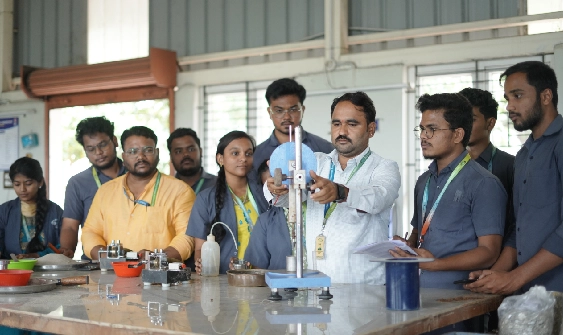

For SC/ST & Other backward classes of Karnataka students only, the minimum marks is 40% in aggregate in the optional subjects in the qualifying examination, irrespective of marks obtained in the Common Entrance Test / COMED-K / AIEEE / any other equivalent entrance examinations. (Eligibility as per the Govt. Norms from time to time).
Programme Educational Objectives (PEOs)
PEO-1
To develop graduates with strong knowledge of civil engineering to excel in their professional careers.
PEO-2
To acquire the necessary skills with leadership qualities, ethics, and values that meet the needs of industry and society.
PEO-3
To engage in lifelong learning for professional enrichment and career advancement
Program outcomes (POs)
PO 1
Engineering knowledge
Apply the knowledge of mathematics, science, engineering fundamentals, and an engineering specialization to the solution of complex engineering problems.
PO 2
Problem analysis
Identify, formulate, review research literature, and analyze complex engineering problems reaching substantiated conclusions using the first principles of mathematics, natural sciences, and engineering sciences.
PO 3
Design/development of solutions
Design solutions for complex engineering problems and design system components or processes that meet the specified needs with appropriate consideration for public health and safety, and cultural, societal, and environmental considerations.
PO 4
Conduct investigations of complex problems
Use research-based knowledge and research methods including design of experiments, analysis and interpretation of data, and synthesis of the information to provide valid conclusions.
PO 5
Modern tool usage
Create, select, and apply appropriate techniques, resources, and modern engineering and IT tools including prediction and modeling to complex engineering activities with an understanding of the limitations.
PO 6
The engineer and society
Apply reasoning informed by the contextual knowledge to assess societal, health, safety, legal & cultural issues and the consequent responsibilities relevant to the professional engineering practice.
PO 7
Environment and sustainability
Understand the impact of professional engineering solutions in societal and environmental contexts, and demonstrate the knowledge of, and need for sustainable development.
PO 8
Ethics
Apply ethical principles and commit to professional ethics & responsibilities and norms of the engineering practice.
PO 9
Individual and team work
Function effectively as an individual, and as a member or leader in diverse teams, and in multi-disciplinary settings.
PO 10
Communication
Communicate effectively on complex engineering activities with the engineering community and with society at large, such as being able to comprehend and write effective reports and design documentation, make effective presentations, and give and receive clear instructions.
PO 11
Project management and finance
Demonstrate knowledge and understanding of the engineering and management principles and apply these to one's work, as a member and leader in a team, to manage projects and in multidisciplinary environments.
PO 12
Life-long learning
Recognize the need for, and have the preparation and ability to engage in independent & life-long learning in the broadest context of technological change.
Programme Specific Outcomes
PSO 1
Graduates will be able to plan, analyze, and design Civil Engineering Structures by utilizing natural resources effectively.
PSO 2
Graduates will be able to apply their Civil Engineering knowledge in the new age construction methods and Techniques to solve real life problems.
Program Curriculum 2022 Scheme
| Sl No | Course code | Course Name |
|---|---|---|
| 1 | 22MATC11 | Mathematics for Civil Engg stream-I |
| 2 | 22PHYC12 | Physics for Civil Engg Stream |
| 3 | 22CIV13 | Engineering Mechanics |
| 4 | 22ESC14x | Engineering Science Course-I |
5 |
22ETC15x | Emerging Technology Course-I |
Or |
||
| 22PLC15x | Programming Language Course-I | |
| 6 | 22ENG16 | Communicative English |
| 7 | 22KSK17/ 22KBK17 |
Samskrutika Kannada/ Balake Kannada |
| 22ICO17 | Indian Constitution | |
| 8 | 22IDT18 | Innovation and Design Thinking |
Or |
||
| 22SFH18 | Scientific Foundations of Health | |
| Sl No | Course code | Course Name |
|---|---|---|
| 1 | **22MATC21 | Mathematics for Civil Engineering-II |
| 2 | 22CHEC22 | Chemistry for Civil Engg Stream |
| 3 | 22CED23 | Computer-Aided Engineering Drawing |
| 4 | 22ESC24x | Engineering Science Course-II |
| 5 | 22PLC25x | Programming Language Course-II |
Or |
||
| 22ETC25x | Emerging Technology Course-II | |
| 6 | 22PWS26 | Professional Writing Skills in English |
| 7 | 22ICO27 | Indian Constitution |
Or |
||
| 22KSK27 22KBK27 |
Samskrutika Kannada/ Balake Kannada | |
| 8 | 22SFH18 | Scientific Foundations of Health |
Or |
||
| 22ITD18 | Innovation and Design Thinking | |
| Sl No | Course code | Course Name |
|---|---|---|
| 1 | 22BB31 | Biology for Engineers |
| 2 | 22CV32 | Engineering Survey |
| 3 | 22CV33 | Engineering Geology |
| 4 | 22CV34 | Strength of Materials |
| 5 | 22CVL35 | Computer Aided Drawing Lab |
| 6 | 22CV36x | Engineering Science Course |
| 7 | 22SC37 | Social Connect and Responsibility |
| 8 | 22CV38x | Departmental Specific Ability Enhancement Course |
| 9 | 22NS39 | National Service Scheme (NSS) |
| 22PE39 | Physical Education (PE) (Sports and Athletics) | |
| 22YO39 | Yoga |
| Sl No | Course code | Course Name | |
|---|---|---|---|
| 1 | 22MCV41 | Applied Mathematics for Civil Engg | |
| 2 | 22CV42 | Fluid Mechanics and Hydraulics | |
| 3 | 22CV43 | Concrete Technology | |
| 4 | 22CV44 | Analysis of structures | |
| 5 | 22CVL45 | Building Materials Testing Lab | |
| 6 | 22CV46X | ESC/ETC/PLC | |
| 7 | 22PSW47 | Professional Skills for the Work Place | |
| 8 | 22UH48 | Universal Human Values course | |
| 9 | 22UH48 | National Service Scheme (NSS) | |
| 22PE49 | Physical Education (PE) (Sports and Athletics) | ||
| 22YO49 | Yoga | ||
| Sl No | Course code | Course Name |
|---|---|---|
| 1 | 22CV51 | Construction Management and Entrepreneurship |
| 2 | 22CV52 | Design of RCC Structures |
| 3 | 22CV53 | Geotechnical Engineering |
| 4 | 22CVL54 | Software Application Laboratory |
| 5 | 22CV55X | Professional Elective Course |
| 6 | 22CVE56 | Extensive survey Project |
| 7 | 22ADA57 | Advanced Aptitude |
| 8 | 22ES58 | Environmental Studies |
| 9 | 22NS59 | National Service Scheme (NSS) |
| 22PE59 | Physical Education (PE) (Sports and Athletics) | |
| 22YO59 | Yoga | |
Professional Elective Courses |
||
| 22CV551 | Advanced Concrete Technology | |
| 22CV552 | Repair, Retrofitting and Rehabilitation of Structures | |
| 22CV553 | Remote Sensing and GIS | |
| 22CV554 | Fire safety in buildings | |
| Sl No | Course code | Course Name |
|---|---|---|
| 1 | 22CV61 | Water Supply and Waste Water Engineering |
| 2 | 22CV62 | Transportation Engineering |
| 3 | 22CV63X | Professional Elective Course |
| 4 | 22CV64X | Open Elective Course |
| 5 | 22CVP65 | Project Phase I |
| 6 | 22CVL66 | Geotechnical Engineering Laboratory |
| 7 | 22RM67 | Research Methodology and IPR |
| 8 | 22NS68 | National Service Scheme (NSS) |
| 22PE68 | Physical Education (PE) (Sports and Athletics) | |
| 22YO68 | Yoga | |
Professional Elective Courses |
||
| 22CV631 | Applied Geotechnical Engineering | |
| 22CV632 | Hydrology and Irrigation Engineering | |
| 22CV633 | Solid waste management | |
| 22CV634 | Design of Formwork and Scaffolding | |
Open Elective Courses |
||
| 22CV641 | Water conservation and Rainwater Harvesting | |
| 22CV642 | Geographic Information Systems | |
| 22CV643 | Integrated Waste Management for a Smart City | |
| 22CV644 | Occupational Health and Safety | |
Ability Enhancement Course / Skill Enhancement Course-V |
||
| 22RM67 | Research Methodology and IPR | |
Faculty
Admission to Higher Semester:
- After the announcement of the reopening date of the college, the candidates have to register for the admission with an application enclosing all the photos copies of previous semesters marks card/s through their department HOD and they have to pay the applicable Tuition Fees / Registration Fees within a week of reopening the institute for class work.
- The students who fail to register within the first week of re-opening, the student will be charged a penalty
- The names of the students will be deleted, in case they fail to register as per the schedule
- Any financial matters are required to be referred to the principal only
- Once the student is admitted he/she will be under the guidance of the department and all the academic matters should be addressed through the Head of the department only.
- Students are expected to maintain discipline in the college campus & not to indulge in “Ragging Activities”.
FAQs
- Structural Engineering: Focuses on the design and analysis of buildings, bridges, and other structures.
- Geotechnical Engineering: Involves the study of soil and rock to support construction projects.
- Environmental Engineering: Deals with water resources, waste management, and environmental impact.
- Transportation Engineering: Concerns the design and maintenance of roads, railways, airports, and other transport infrastructure.
- Construction Engineering and Management: Focuses on the construction process, planning, and management.
Civil engineering graduates can work in various fields like construction, government, infrastructure planning, urban development, and consulting. They may become project managers, site engineers, structural engineers, or environmental consultants, among other roles.
Key skills include strong math and physics knowledge, problem-solving, analytical skills, teamwork, communication, project management, and familiarity with software like AutoCAD, Revit, and Sketch up pro, Stadd pro, Cype etc.
Generally, a bachelor’s degree in civil engineering takes 4 years to complete, including main course subjects, labs, and often a main project and internship for practical experience.
Civil engineering now involves a significant amount of technology, including 3D modelling, simulation software, GIS, and Building Information Modelling (BIM). Programs with strong tech integration provide skills that are valuable in modern civil engineering careers.
The demand for civil engineers generally remains strong, given the need for infrastructure development, maintenance, and environmental sustainability. Emerging areas like sustainable development and smart cities are adding new career opportunities.
